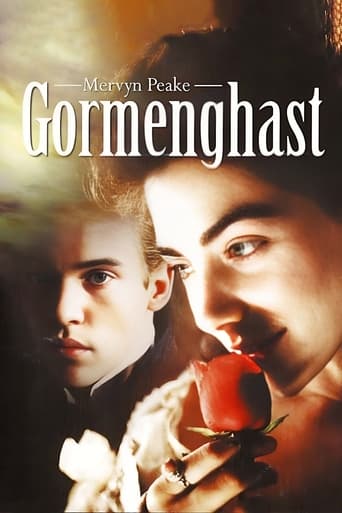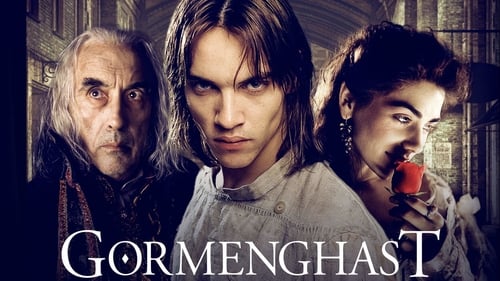Kay Stevens
I have been enthralled by Peake and the Groan trilogy since the 1960s. When Gormenghast came up in conversation recently I decided to watch this BBC series again after twelve years, to refresh my memory of it and see how it held up.I thoroughly enjoyed it. Sure, it's flawed, and anyone hoping for a 'faithful' adaptation (is such a thing possible?) will be disappointed. But the stellar cast, superb performances (by most), exhilarating costumes and imaginative hand-made sets (would so hate to see this rendered by state-of-art CGI) make it a very watchable four hours. It's also worth viewing the 'Making of' short if you can.Not having read the books for a while, I found most of the characters lived up to my memory and mental image. Some didn't quite ring true, but on the whole I think was a valiant effort at condensing a three-volume epic into a short TV series.Special praise for Celia Imrie as Gertrude and John Sessions as Prunesquallor - both excellent...but then so was Christopher Lee, Warren Mitchell, June Brown, Stephen Fry, Richard Griffiths, Lynsey Baxter, Zoe Wanamaker...
phatdan
Visually stunning about a fictional world with good and evil not easily defined within the context of the story. Unique in storytelling, this makes for difficult-to-define protagonists/antagonists. Eventually, the main character transforms into a villain, but when contrasted against the morbid reality of Gormenghast, we can still sympathize with his intentions, pathetic as they may be. A hero eventually arises to save the realm, but is delivered from the claustrophobic and decrepit confines of Gormenghast.Gormenghast probably represents civilization in general. But this civilization runs so smooth and is so old, that it exists for no other reason than existence. There is no reason to improve, no reason to explore, and little reason to question authority. Everything is run by a book of rules. There is government, a monarchy, but like its realm, it exists for a reason long forgotten. No question that Gormenghast is a philosophical offering about the purpose of society and the meaning of existence.A comparison to THX 1138, Brazil, 1984, Quintet, or even Apocalypto could be made, but Gormenghast is different in its portrayal of the individual within a unique, and perhaps even more disturbing reality.
maatmouse-1
Having succeeded in reading the Mervyn Peake Gormenghast trilogy, I finally looked forward to the TV series of which there was much curiosity. Could Peake's sprawling tale of Steerpike's Machiavellian rise and grave descent really be translated that well on TV or would it be better realised as a film? The truth is it works very nicely on the TV and who better to do it justice than the superb cast who are the cream of British and Irish acting.The tale starts with a brief look at the rituals and boredom of the Groan family who rule Gormenghast. Set in a sort of mad, medieval world of rules, rituals and regulations, the Groans are a tortured family of ageing upper class royalty. There is Lord Groan, played in brilliant torment by the late Ian Richardson, Lady Groan wonderfully realised by Celia Imrie and Fuchsia Groan, their lovely but half mad child-woman daughter. There is also the usual assorted collection of hangers-on and nobility such as Dr Prunesquallor and his sister, various servants like Flay (brilliantly realised by Christopher Lee) and Mrs Slagg and, much later on, grotesques like the Cook played by a horrific looking Richard Griffiths. Enter into this colourful mixture the youth Steerpike who comes from the kitchens and attempts to kill, drive mad or seduce his way into the Groan family.The castle itself is a wonder to look at and the set design is why Britain is so good at making these sort of series.
sissoed
I first read the Gormenghast trilogy when I was a moody teenager and they carried an impact I still feel years later. It is a shame the video could not capture the languid atmosphere of the books but I suppose it can't be helped given the limitations of video. I was concerned that the presentation would contradict my own visualization of the characters, but to the contrary the presentation was dead-on. Rather than contradict the books, watching the video was more like seeing the same story but from a different perspective, focusing more on the characters and less on the environment.My main criticism is that the screenwriter (or director or producer, whoever controlled the script) didn't really understand one of the main messages of the books. This comes through in the mishandling of the key character of the Master of Ritual, called the Secretary in the video. Changing the title was a mistake. And so was the change in the character. In the books the first Master of Ritual is old, quiet Sourdust, who helps set the elegiac mood before Steerpike starts to interfere. Steerpike then kills him (accidentally) in the library fire (this is why Steerpike in his later delirium says the sisters make 5 -- Sourdust, Nanny Slagg, Cora, Clarice, Barquentine). (Steerpike did not kill and did not know what happened to Sepulchrave or Swelter, only Flay knew). Steerpike's fire brings nasty, cussing Barquentine into the book, and that is what first causes the mood to change. But in the video, it is nasty Barquentine from the start (although because he isn't named until much later, you think at first it is supposed to be Sourdust). Sourdust is simply deleted. The result is that in the video you always have the nasty element, and Steerpike has no responsibility for it. A key point of the books, however, is that Steerpike's ambition is what causes the mood of the castle to change. I should have thought the screenwriter would be more careful about cutting Steerpike's first murder. The author, Peake, knew what he was doing by starting with Sourdust and having Steerpike kill him.The title of Master of Ritual is important for another reason, a reason that should have prevented the director from changing the title to mere Secretary. It is such an important point: in that castle, Ritual is master, so the Master of Ritual is the true master of the castle. Steerpike wanted to be Master of Ritual because he knew that in that role he could control the law; it was where the real power was. As Master of Ritual he could surreptitiously change the rituals, because no one else could understand their intricacies. In this way he could set everyone dancing to his commands. The Groans were puppets of the Master of Ritual. In the books ritual is all-powerful. Recall that in the video Barquentine complained that Sepulchrave's breakfast was not part of the ritual. The meeting in the library came about only because of the breakfast, wherein Sepulchrave defied the control of ritual, to plan an act (the breakfast) intended to show his love for his son. Yet that led to the burning and Sepulchrave's madness and death. Sepulchrave's penalty for defying ritual was terrible. Steerpike wanted to marry Fushia and thus combine in himself both the control of the ritual, and be the central player in the ritual. But the dedication of the loyal servant of ritual, Barquentine (who burned Steerpike and made him mad) and the loyal servant of nobility, Flay (who relentlessly tracked Steerpike) along with the goodhearted, intelligent Prunesquallor and the heir, Titus, defeated Steerpike, preserved the ruling family, and thus preserved the ritual. Then Titus, having preserved the ritual, flees it, because he knows it is too powerful to defeat. I think a more understanding screenwriter would have developed these themes more clearly and still had a compelling drama.Lastly, I was disappointed in the flooding sequence and the hunt for Steerpike, which was very compressed in time and in visual scope; this should have been developed with sweep and steadily-building tension. I would have preferred they cut or compress the Bellgrove/ professor sequences entirely to devote the time to a really powerful climactic flood/hunt sequence.





